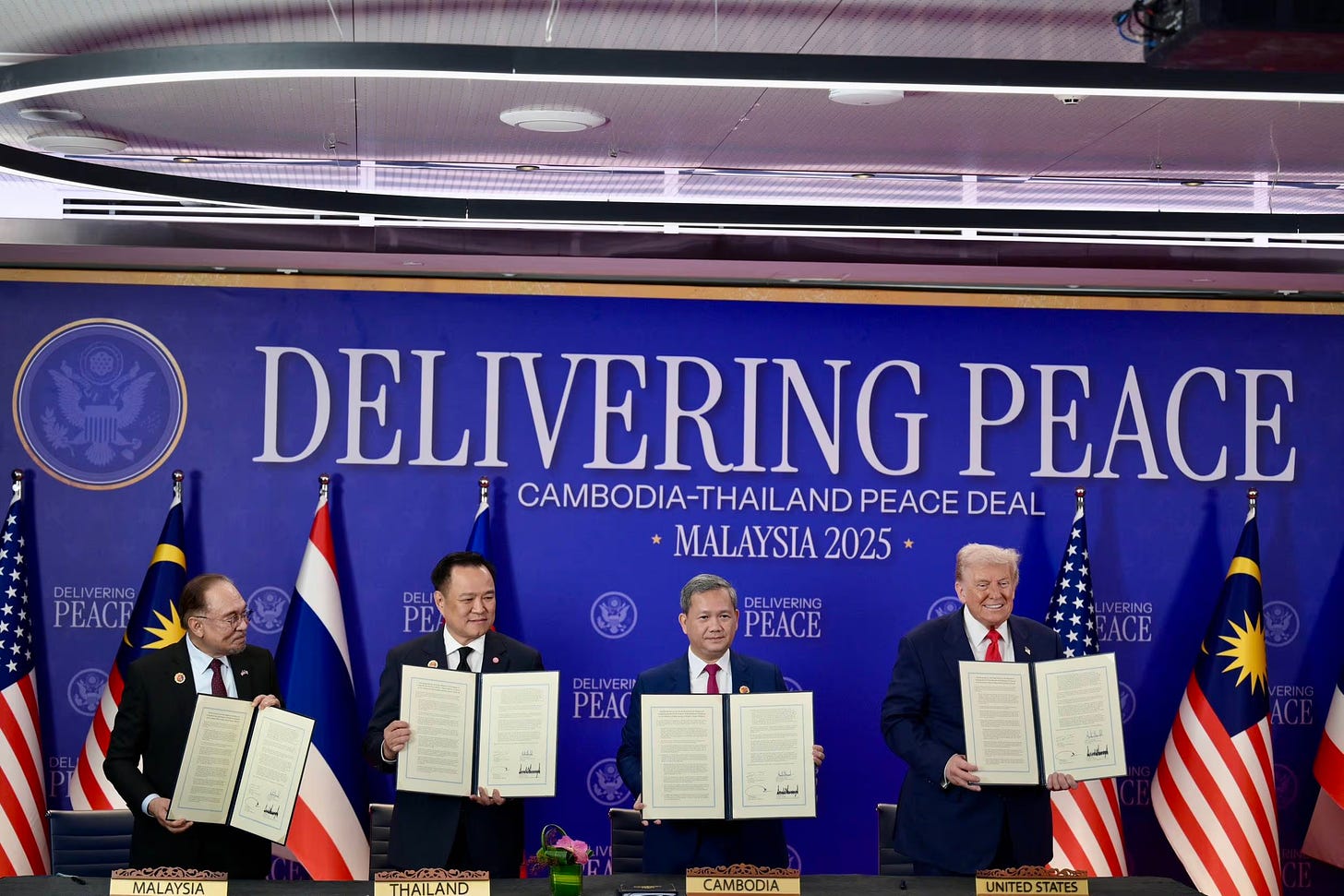Anutin's International Debut
New prime minister makes deals at ASEAN and APEC summits

Last week saw a whirlwind of diplomacy for Prime Minister Anutin Charnvirakul. Thanks to the ASEAN Summit and the APEC Leaders’ Summit being held consecutively, Anutin had the opportunity to meet with several major world leaders, including US President Donald Trump and Chinese President Xi Jinping. These marked the first major diplomatic engagements of Anutin’s premiership.
In Malaysia, Anutin and Cambodian Prime Minister Hun Manet signed the “Kuala Lumpur Peace Accords.” This deal saw the two countries pledge to move heavy weapons away from the border, resume the use of usual diplomatic channels, work together to de-mine the border, and cooperate on cracking down on scam centers. Sebastian Strangio in The Diplomat has written what I think is an accurate assessment of the deal:
The fact that Trump was able to force both sides to the table, with a hard deadline for the finalization of an agreement, could be a positive step in the direction of diplomatic normalization between Cambodia and Thailand. By tying his own prestige to the Kuala Lumpur Declaration, Trump may also make it harder for either side to take actions that strain or break the current ceasefire.
At the same time, despite the two sides’ commitment to demarcation efforts via the existing bilateral mechanisms, the agreement is unlikely to resolve the fundamental causes of the dispute: differing interpretations of a treaty signed between French Indochina and the Kingdom of Siam in 1907. It is apparent that a great deal of mistrust still exists between Bangkok and Phnom Penh, and that both are to varying degrees beholden or vulnerable to nationalist constituencies that view any concessions on the above issue as a form of capitulation.
The United States and Thailand also inked an unexpected deal on rare earths. Thailand is not known for rare earths; as the Bangkok Post says, “The country’s known reserves of rare earth minerals are not seen as economically viable, though Thailand does import rare earth minerals from Australia for processing and re-export.” Per The Nation Deputy Prime Minister and Minister of Finance Ekniti Nitithanprapas has clarified that the deal is “a mutual understanding to enhance cooperation in supply chain development and investment” and is not legally binding; it is also seen as beneficial for Thailand’s tariff talks with the United States.
Which brings us to another important element of Anutin’s international tour: his discussions on US tariffs with Trump. Thailand and the United States signed a trade agreement where Thailand pledged to remove tariffs on 99 percent of US goods, while the US would maintain its 19 percent tariffs on Thai products but identify products for a zero percent tariff. In South Korea, Anutin was filmed having an informal discussion with Trump after a dinner with APEC leaders. In the video, Anutin’s remarks are mostly inaudible, but Anutin said that he asked for a more favorable tariff rate. Trump can be heard asking if Thailand has been in discussions with US Trade Representative Jamieson Greer. According to Anutin, Trump returned to talk to him afterwards; the Thai government says Trump promised to discuss this matter with Greer. We don’t know what Anutin is willing to promise to persuade the US to reduce its tariff rate further.
Anutin’s discussions with Xi Jinping took a different track. Back in February, Xi had discussed Thailand’s efforts to crack down on online scams with then-prime minister Paetongtarn Shinawatra. Anutin later claimed that Xi had warned Paetongtarn that Thailand should not proceed with casino legalization. Unsurprisingly, then, Anutin pledged to Xi that his government would not legalize gambling. In the Chinese readout, Xi continued to underscore the need to “step up the fight against transnational crimes such as online gambling and telecom fraud so as to create a safe environment for bilateral exchanges and cooperation.” At the end of their meeting, Anutin reminded Xi of a deal to buy 500,000 tonnes of Thai rice.
Anutin also had meetings on the margins of APEC with other world leaders, such as South Korean President Lee Jae-myung (who also discussed the fight against online scam centers, a mutual topic of interest) and Canadian Prime Minister Mark Carney (where an agreement to launch free trade negotiations was made).
The trip was largely a success for Anutin, elevating his image as Thailand’s representative on the world stage (something at least marginally helpful for the upcoming elections). But he did not escape without damage, making one major gaffe and coming under some domestic pressure for his international dealmaking. At the same time, one wonders what foreign governments made of his status as a self-proclaimed short-term prime minister. A new Thai prime ministers has attended these international conferences every year since 2022. If the revolving door of leaders continues, making Bangkok’s foreign policy difficult to stabilize, it is hard to see Thai diplomacy’s weight being fully restored.

